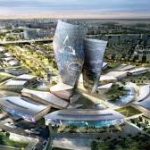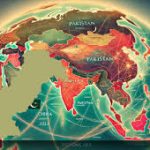Introduction
The year 2025 is proving to be a defining moment for Middle Eastern politics. Regional powers are reassessing their alliances, global superpowers are shifting their strategies, and emerging technologies are influencing both diplomacy and conflict. For Kuwait, a nation often seen as a voice of moderation in the region, the challenges and opportunities of this new political landscape are immense.
This article explores the key political trends shaping the Middle East in 2025, from shifting U.S. and Chinese influence to regional rivalries, economic diversification, and the role Kuwait is playing in promoting peace and stability.
U.S. and Chinese Influence in the Middle East
For decades, the Middle East was heavily shaped by U.S. military and political involvement. But in 2025, China has become a dominant player through trade, infrastructure projects, and energy partnerships. The Belt and Road Initiative continues to expand, making Beijing a major economic partner for Gulf nations.
The United States, while still influential, is focusing more on strategic partnerships rather than direct interventions. Washington is also working to strengthen its influence in digital technologies and defense collaborations, counterbalancing China’s growing presence.
Kuwait, with its strategic location and reputation for diplomacy, has been careful to balance relations with both powers. By maintaining neutrality, Kuwait positions itself as a trusted mediator and safe investment hub.
Regional Rivalries and Cooperation
The Middle East continues to face political rivalries—Saudi Arabia and Iran remain central players in shaping the region’s dynamics. However, 2025 has also seen an increase in diplomatic engagement, with more nations favoring dialogue over confrontation.
-
Saudi Arabia–Iran Rapprochement: The cautious reconciliation that began earlier in the decade has continued, reducing the risk of direct conflict.
-
GCC Unity: The Gulf Cooperation Council (GCC) is working more closely on security, energy, and digital economy initiatives.
-
Palestine–Israel Relations: Tensions remain high, though international calls for a two-state solution have intensified, with Kuwait continuing its strong support for Palestinian rights.
The Rise of Energy and Economic Diplomacy
As the world transitions toward renewable energy, Middle Eastern oil exporters are diversifying their economies. Kuwait has invested heavily in renewable projects, smart cities, and financial services to reduce dependence on oil revenues.
Political alliances are increasingly being shaped by economic partnerships. For example, Gulf nations are collaborating with Europe and Asia on hydrogen projects and carbon-neutral technologies. This economic diplomacy is reducing reliance on traditional energy exports while opening new political doors.
Security and Technological Shifts
Security in the Middle East is no longer defined solely by military might. In 2025, cybersecurity, artificial intelligence, and quantum technology have become critical to national defense.
-
Cyberattacks are being used as tools of political pressure.
-
Drones and AI-based defense systems are redefining warfare.
-
Countries with strong digital infrastructure are gaining geopolitical leverage.
Kuwait has invested in cyber defense systems and regional intelligence-sharing initiatives, ensuring that it is not left behind in the technological race.
Kuwait’s Diplomatic Role
Kuwait has historically played the role of mediator in regional conflicts, and in 2025 this tradition continues. Kuwait is actively involved in:
-
Mediating disputes within the GCC.
-
Supporting humanitarian aid in conflict zones such as Yemen and Syria.
-
Advocating for peaceful solutions in Palestine–Israel negotiations.
-
Hosting international conferences on climate change and technology governance.
By focusing on diplomacy and neutrality, Kuwait enhances its image as a stabilizing force in an often turbulent region.
Impact of Global Conflicts on the Middle East
Beyond the region, global conflicts also influence Middle Eastern politics. Russia’s shifting role in energy markets, Europe’s focus on green transitions, and Africa’s rising influence all shape the region’s strategies.
The Middle East remains a key energy hub, but also a strategic crossroads for global trade and security. Kuwait, as a member of OPEC and a partner in international trade, plays an important role in ensuring stability in global markets.
The Future of Regional Cooperation
Looking ahead, Middle Eastern politics will depend on the ability of nations to cooperate on shared challenges such as climate change, energy transition, food security, and technological transformation. Kuwait’s foreign policy is increasingly focusing on these non-traditional security issues, recognizing that the region’s future stability requires more than military strength.
FAQs
Q1: What role is China playing in the Middle East in 2025?
China is expanding its influence through trade, infrastructure, and technology partnerships, becoming a major economic player.
Q2: Is U.S. influence in decline in the region?
The U.S. remains important but is shifting from direct intervention to strategic partnerships, especially in defense and technology.
Q3: How is Kuwait navigating these changes?
Kuwait balances relations with both the U.S. and China, maintaining neutrality while strengthening its diplomatic role.
Q4: What are the biggest security threats in the Middle East in 2025?
Cybersecurity, technological warfare, and regional instability remain top concerns.
Q5: What is Kuwait’s foreign policy focus in 2025?
Promoting diplomacy, supporting humanitarian causes, and preparing for economic diversification.
Conclusion
The political landscape of the Middle East in 2025 is shaped by shifting superpower influence, regional rivalries, and the urgent need for economic diversification. While challenges remain, there is also an increasing appetite for cooperation and dialogue.
Kuwait, true to its tradition of diplomacy and neutrality, continues to play a critical role in fostering stability, supporting peace initiatives, and building a sustainable future for the region.
As global and regional politics evolve, Kuwait’s balanced approach ensures that it remains a key voice in shaping the Middle East of tomorrow.








